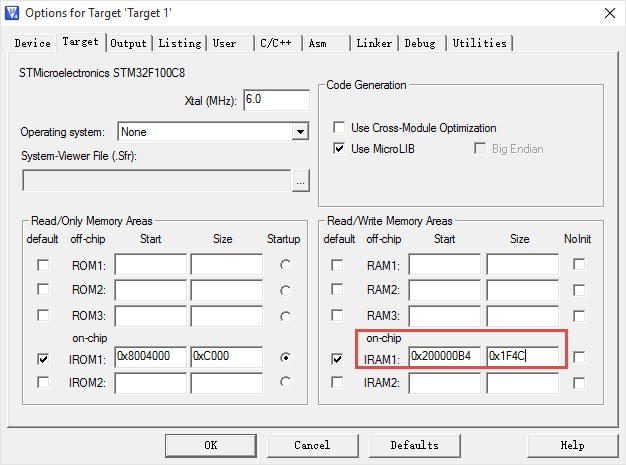【转】STM32F0系列MCU中断向量表的重映射
0赞最近使用了一款Cortex-M0内核的芯片STM32F030CC,发现它中断向量表的重映射方法与STM32F10x系列的有所区别,在这里记录与分享一下。
由于需要通过IAP进行固件升级,所以芯片的FLASH里面要烧录两份代码:一个Boot loader, 一个用户应用程序。理所当然的,在用户应用程序中,必须得重新映射中断向量表。
可是在ST提供的固件库里,我却没有发现类似于stm32f10x固件库中的void NVIC_SetVectorTable(uint32_t NVIC_VectTab, uint32_t Offset)接口。
浏览了一下Cortex-M0的Programming manual,原来M0并没有SCB->VTOR这个寄存器,难怪ST的库里没有提供NVIC_SetVectorTable这个接口。
这下要怎么办?在网络上搜索了一下,受到网友findaway123这篇文章的启发,我在STM32F030CC的Reference manual中找到以下说明:
Physical remap
Once the boot mode is selected, the application software can modify the memory accessible in the code area.This modification is performed by programming the MEM_MODE bits in the SYSCFG configuration register 1 (SYSCFG_CFGR1). Unlike Cortex® M3 and M4, the M0 CPU does not support the vector table relocation. For application code which is located in a different address than 0x0800 0000, some additional code must be added in order to be able to serve the application interrupts. A solution will be to relocate by software the vector table to the internal SRAM:
• Copy the vector table from the Flash (mapped at the base of the application load address) to the base address of the SRAM at 0x2000 0000.
• Remap SRAM at address 0x0000 0000, using SYSCFG configuration register 1.
• Then once an interrupt occurs, the Cortex®-M0 processor will fetch the interrupt handler start address from the relocated vector table in SRAM, then it will jump to execute the interrupt handler located in the Flash.
This operation should be done at the initialization phase of the application. Please refer to AN4065 and attached IAP code fromwww.st.com for more details.
OK,解决方法找到了!
在用户应用程序中,按照以上方法,添加以下两行代码:
memcpy((void*)0x20000000, (void*)0x08004000, VECTOR_SIZE);
SYSCFG_MemoryRemapConfig(SYSCFG_MemoryRemap_SRAM);
其中,0x2000 0000是SRAM的起始地址,这个不需要改动。
而之后的两个参数需要根据实际情况作出修改。0x0800 4000是应用程序的起址地址,从这里开始的VECTOR_SIZE字节,存放是的应用程序的中断向量表。VECTOR_SIZE是指中断向量表的大小,具体多大可以在startup.s文件里计算得到。以下以startup_stm32f030.s为例作说明:
1 Stack_Size EQU 0x00000400 2 3 AREA STACK, NOINIT, READWRITE, ALIGN=3 4 Stack_Mem SPACE Stack_Size 5 __initial_sp 6 7 8 ; <h> Heap Configuration 9 ; <o> Heap Size (in Bytes) <0x0-0xFFFFFFFF:8> 10 ; </h> 11 12 Heap_Size EQU 0x00000200 13 14 AREA HEAP, NOINIT, READWRITE, ALIGN=3 15 __heap_base 16 Heap_Mem SPACE Heap_Size 17 __heap_limit 18 19 PRESERVE8 20 THUMB 21 22 23 ; Vector Table Mapped to Address 0 at Reset 24 AREA RESET, DATA, READONLY 25 EXPORT __Vectors 26 EXPORT __Vectors_End 27 EXPORT __Vectors_Size 28 29 __Vectors DCD __initial_sp ; Top of Stack 30 DCD Reset_Handler ; Reset Handler 31 DCD NMI_Handler ; NMI Handler 32 DCD HardFault_Handler ; Hard Fault Handler 33 DCD 0 ; Reserved 34 DCD 0 ; Reserved 35 DCD 0 ; Reserved 36 DCD 0 ; Reserved 37 DCD 0 ; Reserved 38 DCD 0 ; Reserved 39 DCD 0 ; Reserved 40 DCD SVC_Handler ; SVCall Handler 41 DCD 0 ; Reserved 42 DCD 0 ; Reserved 43 DCD PendSV_Handler ; PendSV Handler 44 DCD SysTick_Handler ; SysTick Handler 45 46 ; External Interrupts 47 DCD WWDG_IRQHandler ; Window Watchdog 48 DCD 0 ; Reserved 49 DCD RTC_IRQHandler ; RTC through EXTI Line 50 DCD FLASH_IRQHandler ; FLASH 51 DCD RCC_IRQHandler ; RCC 52 DCD EXTI0_1_IRQHandler ; EXTI Line 0 and 1 53 DCD EXTI2_3_IRQHandler ; EXTI Line 2 and 3 54 DCD EXTI4_15_IRQHandler ; EXTI Line 4 to 15 55 DCD 0 ; Reserved 56 DCD DMA1_Channel1_IRQHandler ; DMA1 Channel 1 57 DCD DMA1_Channel2_3_IRQHandler ; DMA1 Channel 2 and Channel 3 58 DCD DMA1_Channel4_5_IRQHandler ; DMA1 Channel 4 and Channel 5 59 DCD ADC1_IRQHandler ; ADC1 60 DCD TIM1_BRK_UP_TRG_COM_IRQHandler ; TIM1 Break, Update, Trigger and Commutation 61 DCD TIM1_CC_IRQHandler ; TIM1 Capture Compare 62 DCD 0 ; Reserved 63 DCD TIM3_IRQHandler ; TIM3 64 DCD 0 ; Reserved 65 DCD 0 ; Reserved 66 DCD TIM14_IRQHandler ; TIM14 67 DCD TIM15_IRQHandler ; TIM15 68 DCD TIM16_IRQHandler ; TIM16 69 DCD TIM17_IRQHandler ; TIM17 70 DCD I2C1_IRQHandler ; I2C1 71 DCD I2C2_IRQHandler ; I2C2 72 DCD SPI1_IRQHandler ; SPI1 73 DCD SPI2_IRQHandler ; SPI2 74 DCD USART1_IRQHandler ; USART1 75 DCD USART2_IRQHandler ; USART2 76 77 __Vectors_End 78 79 __Vectors_Size EQU __Vectors_End - __Vectors 80 81 AREA |.text|, CODE, READONLY 82 83 ; Reset handler routine 84 Reset_Handler PROC 85 EXPORT Reset_Handler [WEAK] 86 IMPORT __main 87 IMPORT SystemInit 88 89 90 91 LDR R0, =__initial_sp ; set stack pointer 92 MSR MSP, R0 93
我们只需关注其中的一小部分。从29行开始,直到75行,每一个DCD都代表一个中断向量(所谓中断向量,说得明白点,其实就是某个中断服务程序的入口地址)。例如第74行的:
DCD USART1_IRQHandler ; USART1
这里的“USART1_IRQHandler"其实就是UART1中断服务程序USART1_IRQHandler这个函数,同时,它也代表这个函数的入口地址。
以上代码即定义了这样一张表,这张表包括45个元素,每个元素是一个长度为4字节的地址。除了第一个地址是SP(堆栈指针)外,其它的地址都是某个中断服务程序的入口地址。
那么,回到我们要解决的问题上来,之前memcpy函数中的第三个参数VECTOR_SIZE,针对本例,就应该是45*4=180(0xB4)个字节。
在执行完以上两行代码后,若发生中断,CPU就会去SRAM(即0x2000 0000处)取中断向量了,所以,以0x2000 0000作为起始地址之后的VECTOR_SIZE个字节就不能被改动了。为了达到这VECTOR_SIZE个字节不被修改的目的,如下两种方法可以实现。
•在工程文件内修改SRAM的起始地址及长度,如下图

•如果使用了分散加载文件,则在分散加载文件中修改SRAM的起始地址及长度也能达到目的。
至此,STM32F0系列Cortex-M0内核芯片中断向量表重映射的问题已解决。

